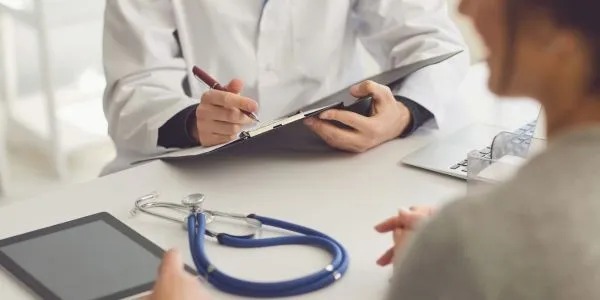Introduction
Adolescence marks a critical period of physical, emotional, and social development. During this transformative phase, young people experience significant changes that shape their future health and well-being. Comprehensive reproductive health education provides adolescents with essential knowledge about their bodies and development, yet many teens in India, particularly in the Delhi NCR region, lack access to accurate information. The World Health Organization reports that around 16 million adolescents give birth each year globally, with 95% of these births taking place in low- and middle-income countries, including India

As a specialized Reproductive health Doctor in Delhi, healthcare professionals observe that many reproductive health issues could be prevented or better managed with proper education and early intervention. This article explores the crucial reasons why reproductive health education is essential for adolescents, particularly in the Delhi NCR region, and how specialized care from reproductive health specialists can make a difference in adolescent health outcomes.
Understanding Reproductive Health Education
What is Adolescent Reproductive Health Education?
Adolescent reproductive health education encompasses a broad range of topics designed to equip young people with knowledge about their bodies, relationships, and sexual health. Proper adolescent reproductive health programs can significantly reduce unwanted pregnancies and STIs. This education goes beyond basic biology to include emotional, social, and ethical dimensions of sexuality and relationships.
The World Health Organization recommends that comprehensive reproductive health education should include:
- Age-appropriate information about body development
- Scientific accuracy in all content
- Cultural sensitivity in approach
- Rights-based educational framework
- Information about relationships and consent
- Knowledge about contraception methods
- STI prevention strategies
- Mental health aspects related to sexuality
Schools in Delhi NCR are increasingly incorporating reproductive health education into their curriculum, though challenges remain in implementation and coverage.
Key Reasons Why Reproductive Health Education is Crucial for Adolescents
1. Preventing Unintended Pregnancies
One of the most compelling reasons for reproductive health education is its effectiveness in reducing teen pregnancies. Research shows that adolescents who receive comprehensive sexual health education are more likely to delay sexual activity and use contraception when they become sexually active.
In Delhi NCR, where adolescent pregnancy rates remain a concern, education serves as a critical intervention. Studies indicate that comprehensive education programs can lead to a 15% reduction in adolescent pregnancies and a 37% decrease in repeat adolescent pregnancies. These statistics highlight the tangible impact of knowledge on health outcomes.
2. Reducing Sexually Transmitted Infections (STIs)
Discussions about teen sexual health should be age-appropriate and scientifically accurate. Lack of proper education increases adolescents’ risk of contracting sexually transmitted infections (STIs), potentially resulting in serious long-term health complications. Comprehensive sexual health education empowers teens with essential knowledge about prevention, recognizing symptoms, and the importance of timely medical care.
In Delhi, healthcare providers report that many adolescents seek treatment for STIs at advanced stages due to lack of awareness about symptoms and prevention methods. Early education can significantly reduce these cases and promote healthier behaviors.
3. Promoting Healthy Relationships and Consent
Reproductive health education extends beyond physical health to include crucial social aspects like healthy relationships and consent. These lessons help adolescents develop respect for themselves and others, understand boundaries, and recognize unhealthy relationship patterns.
Effective sexual health education for adolescents covers both physical and emotional aspects of relationships. By learning about consent and communication, teens are better equipped to navigate relationships in healthy ways and avoid potentially harmful situations.
4. Addressing Gender Inequality
Comprehensive reproductive health education challenges harmful gender stereotypes and promotes equality. By teaching all genders about respect, consent, and shared responsibility, education programs help create a foundation for more equitable relationships and societies.
In Delhi NCR, where gender disparities can be pronounced, education serves as a powerful tool for change. Programs that address gender norms have shown positive impacts on attitudes and behaviors among adolescents of all genders.
5. Early Identification of Reproductive Health Issues
Early identification of delayed puberty in children allows for timely intervention and treatment. Reproductive health education helps adolescents recognize when something might be amiss with their development or health, encouraging them to seek professional help when needed.
For conditions like PCOD (Polycystic Ovary Disorder), early detection can significantly improve management and outcomes. A PCOD diet consultant Delhi can help adolescents manage symptoms through proper nutrition. With proper education, teens can identify warning signs and seek appropriate care before conditions worsen.
Challenges in Adolescent Reproductive Health Education
Cultural and Social Barriers
Implementing adolescent sexual health education should be comprehensive, accurate, and culturally sensitive. In Delhi NCR, cultural taboos and social stigma often create barriers to open discussions about reproductive health. Parents, educators, and healthcare providers may feel uncomfortable addressing these topics, leaving adolescents to seek information from potentially unreliable sources.
Overcoming these barriers requires a collaborative approach involving families, schools, healthcare providers, and community organizations. By creating culturally sensitive programs that respect diverse values while providing accurate information, educators can bridge the gap between cultural norms and health needs.
Lack of Trained Educators
Another significant challenge is the shortage of properly trained educators who can deliver reproductive health information effectively. Many teachers lack specialized training in reproductive health topics and may feel ill-equipped to address students’ questions and concerns.
Schools implementing adolescent sexual health education report fewer cases of risky behaviors. Enhancing teacher training and supplying adequate resources can greatly strengthen the effectiveness and quality of reproductive health education programs in Delhi schools
Limited Access to Services
Even with education, adolescents need access to reproductive health services for comprehensive care. Reproductive health services examples in Delhi include counseling, screening, and educational workshops. However, many teens face barriers to accessing these services, including lack of youth-friendly facilities, concerns about confidentiality, and financial constraints.
The implementation of Adolescent Friendly Health Clinics (AFHCs) in Delhi NCR has been a positive step toward addressing these challenges. These clinics provide confidential and non-judgmental care specifically designed for adolescent needs.
Special Focus: PCOD and Delayed Puberty
Understanding PCOD in Adolescents
Polycystic Ovary Disorder (PCOD) affects approximately 10% of the global female population, with higher rates (9-22%) reported in India. This condition often manifests during adolescence, making it a critical topic in reproductive health education.
Consulting with a PCOD diet consultant Delhi is recommended for teens diagnosed with hormonal imbalances. Treatment typically involves a comprehensive approach including:
- Lifestyle modifications
- Hormonal therapy when necessary
- Weight management strategies
- Regular exercise routines
- Dietary interventions
- Medication when appropriate
Timely intervention can greatly enhance outcomes and help prevent the long-term complications linked to PCOD.
Addressing Delayed Puberty
Parents should consult specialists if they notice signs of delayed puberty in children. Delayed puberty can cause significant distress for adolescents and may indicate underlying health conditions that require attention.
Diagnostic considerations for delayed puberty include:
- Hormonal evaluation
- Assessment of PCOD/PCOD correlation
- Monitoring of pubertal progression
- Evaluation of metabolic factors
Treatment strategies typically involve:
- Individualized treatment plans
- Hormonal therapy when indicated
- Regular monitoring
- Lifestyle interventions
- Psychological support
Consulting with a Reproductive health Doctor in Delhi can help address concerns about development and hormonal issues. Early identification and intervention can help adolescents achieve normal development and prevent psychological distress.
Expert Approach to Adolescent Reproductive Health
Comprehensive Care Model
A specialized Reproductive health Doctor in Delhi can provide personalized care for adolescents. The comprehensive care model includes:
- Thorough evaluation of physical development
- Assessment of hormonal balance
- Consideration of psychological factors
- Family involvement when appropriate
- Long-term monitoring and support
This comprehensive approach addresses every facet of adolescent reproductive health, resulting in improved outcomes and a higher quality of life.
Personalized Treatment Plans
With over 20 years of experience in the field, Dr Niti Agarwal develops individualized treatment plans that consider each adolescent’s unique needs and circumstances. These plans may include:
- Personalized care strategies
- Evidence-based treatments
- Long-term wellness programs
- Regular monitoring and follow-up
By tailoring treatment to individual needs, specialists can more effectively address reproductive health issues and support healthy development.
The Role of Parents and Educators
Supporting Open Communication
Parents play a crucial role in supporting adolescent reproductive health through open communication. Research shows that adolescents who can discuss reproductive health topics with their parents are more likely to make healthy decisions and seek appropriate care when needed.
Tips for parents to support reproductive health education include:
- Starting conversations early, before puberty begins
- Using age-appropriate language and concepts
- Being honest and accurate in providing information
- Respecting privacy while remaining available for questions
- Collaborating with healthcare providers and educators
School-Based Programs
Sexual and reproductive health education delivered in schools has demonstrated substantial positive effects on adolescents’ health outcomes. Successful school programs usually incorporate:
- Age-appropriate curriculum
- Trained educators
- Interactive teaching methods
- Regular updates based on current research
- Parent involvement components
Schools in Delhi NCR are increasingly implementing comprehensive reproductive health education programs, though coverage and quality vary across institutions.
Digital Resources and Accessibility
Online Education Platforms
In today’s digital age, online platforms offer valuable resources for reproductive health education. These platforms can provide:
- Accurate, age-appropriate information
- Interactive learning experiences
- Anonymous question-and-answer opportunities
- Resources in multiple languages
- Accessibility for adolescents with limited access to in-person education
While digital resources cannot replace in-person education and healthcare, they serve as important supplements, particularly for adolescents who may not have access to comprehensive programs in their schools or communities.
Mobile Health Applications
Mobile health applications focused on reproductive health can help adolescents track their development, learn about their bodies, and access reliable information. These applications can be particularly valuable in regions like Delhi NCR, where smartphone usage is high among adolescents.
Features of effective reproductive health applications include:
- Scientific accuracy
- Age-appropriate content
- Privacy protections
- User-friendly interfaces
- Local resource connections
Conclusion
Comprehensive reproductive health education is not merely beneficial but crucial for adolescents in Delhi NCR and beyond. By providing accurate information, promoting healthy attitudes, and facilitating access to appropriate healthcare services, education empowers young people to make informed decisions about their bodies and relationships.
The benefits extend far beyond individual health outcomes to include broader social impacts like gender equality, reduced healthcare costs, and improved community well-being. As parents, educators, healthcare providers, and community members, we share the responsibility of ensuring that all adolescents have access to the information and services they need for healthy development.
For families in Delhi NCR seeking specialized reproductive health care for adolescents, resources are available through institutions like Indus Hospital, where experienced specialists provide comprehensive care tailored to adolescent needs. By combining education, healthcare access, and supportive environments, we can help the next generation achieve optimal reproductive health and overall well-being.


